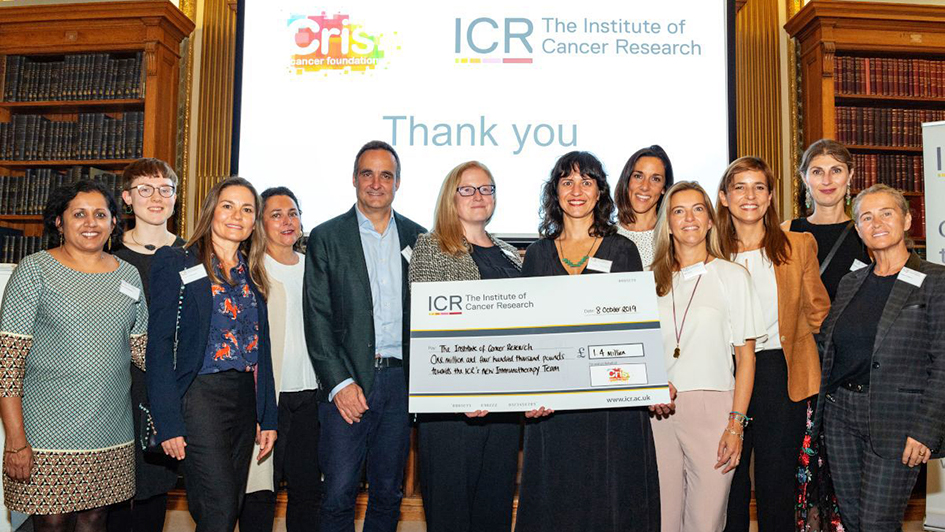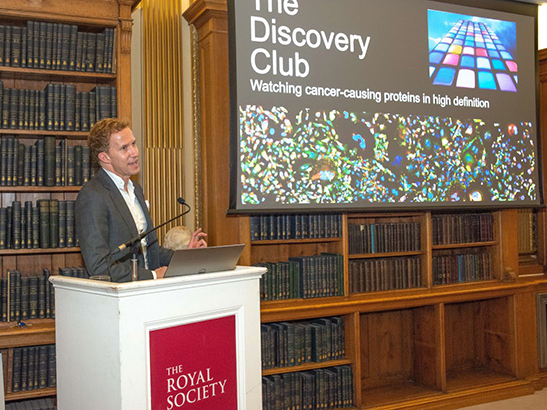
Image: Cheque from CRIS Cancer Foundation at The Discovery Club
At our recent Discovery Club event, members thanked CRIS Cancer Foundation for their donation of £1.4 million to support immunotherapy research at the ICR.
New team leader Dr Astero Klampatsa received the cheque on behalf of the ICR. Her research is working to understand tumour immune responses, which will be funded by the donation from CRIS.
The Discovery Club is our high-level giving club, whose members help us drive forward our scientific strategy through philanthropic investment in key organisational priorities.
The evening included a talk from Professor Chris Bakal, Professor of Cancer Morphodynamics at the ICR, who told them about his work to look at cancer cells in unprecedented detail.
Guests heard how super-resolution microscopes are helping our researchers watch cancer cells move in high definition – as part of their work to combat cancer’s ability to metastasise and spread around the body.
Investing in immunotherapy research at the ICR
A cheque for £1.4 million was presented by the founders of the CRIS Cancer Foundation, Lola Manterola and Diego Megia, to help fund immunotherapy research at the ICR.
We have already made exciting progress in developing immunotherapy treatments for patients with cancer, and this donation from CRIS will help us to continue taking significant strides forward, by setting up a new team in the ICR’s Division of Cancer Therapeutics led by Dr Klampatsa.
Dr Klampatsa’s Thoracic Oncology Immunotherapy Team will focus on understanding malignant mesothelioma, a highly lethal cancer that develops in the protective lining of the lungs and chest cavity which is mainly caused by exposure to asbestos.
The immune system fails to produce enough of a type of immune cell called T cells in response to this cancer, and her research aims to understand what underpins this poor response.
She will also look at identifying signals which indicate that the cancer is likely to respond to immunotherapies, and develop new therapies in the form of CAR T cells – these are produced by engineering a patients’ T cells to attack specific molecules on the surface of their tumours.
CRIS Cancer Foundation’s President and Founder, Lola Manterola said: “When Diego and I founded CRIS we wanted to give a chance to survive to the many cancer patients that do not respond to the standard treatments. To invest in cancer research and clinical trials could give them hope. This happened to me when I was diagnosed with an incurable cancer and given 4 months to live. An experimental treatment brought me back to life”.
“CRIS is really proud to support oncology projects at the ICR and helping to move forward on the fight against cancer”.
Cancer cells are ‘shape-shifters’
Understanding the purpose and shape of healthy cells is significant to understanding how cancer cells can move around the body.
Professor Bakal told the audience gathered that there are 73 trillion cells in the human body, each one having a specific purpose and shape to do its job properly.
Healthy cells tend to have a fixed shape and are unable to move, but aggressive cancer cells have developed mutations that allow them to easily change their shape to move around inside the body.
He showed metastatic melanoma cells in a microscopic maze could move very quickly and pass through gaps smaller than their own nucleus, which is how they can spread. They can also use this shape-shifting technique to evade the immune system and hide from attack.
Professor Bakal explained why his work would not be possible without access to cutting edge imaging technology, often funded by generous donations to the ICR – as well as the computational methods and expertise to make sense of the huge amount of data produced.
Watching cancer-causing proteins in HD
Donations from supporters are helping Chris use super-resolution microscopes to look at cancer cells closer than ever before, to study individual proteins that play a key role in cell shape and movement.
His team have seen for the first time that proteins on the surface of cells which help them sense their environment can bend to help cancer cells move quickly. Drugs that block this process could prevent cancer cells from changing shape and improve treatment.
Professor Bakal said: “If we can target cell shape changes, if we can freeze cancer cells in one particular shape, we can stop them from metastasising, and we can turn an incurable disease into a curable one.”
Our campaign for the Centre for Cancer Drug Discovery
The evening ended with a screening of UK Poet Laureate Simon Armitage reciting ‘Finishing It’, a poem he has written to support our capital appeal, symbolising the goal of precision science to turn cancer into a manageable disease.
The poem is part of a campaign to raise funds to finish our revolutionary new research building – the Centre for Cancer Drug Discovery – where research will focus on overcoming cancer evolution and drug resistance.
The poem has been micro-engraved onto a replica anti-cancer pill and will be displayed permanently in the new Centre when it opens next year.
The centre is a £75m project – and we now have less than £14m to raise. To make our building a reality, we urgently need your philanthropic support.
The Discovery Club
Discovery Club members are a special group of visionary supporters who help us to make the discoveries that defeat cancer by making an annual investment in our work.
Through a regular series of exclusive events, members get personal access to some of the leading ICR scientists and clinicians and hear about their work, and the ways that their support is making a difference.
To learn more about The Discovery Club and to become a member, please contact Hannah Joyce, Deputy Director of Philanthropy.
